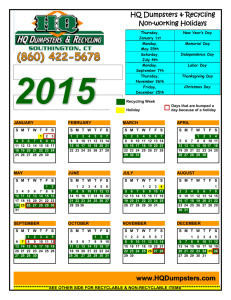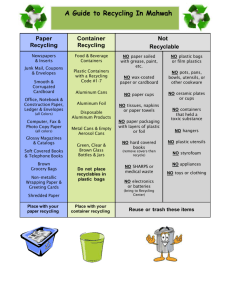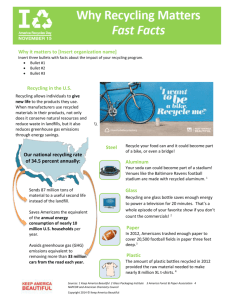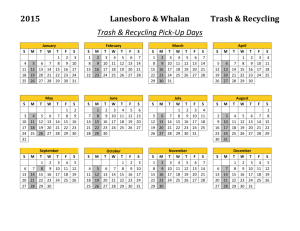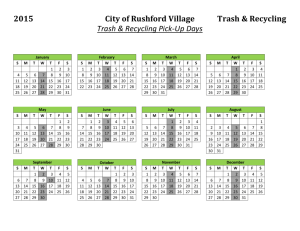File
advertisement
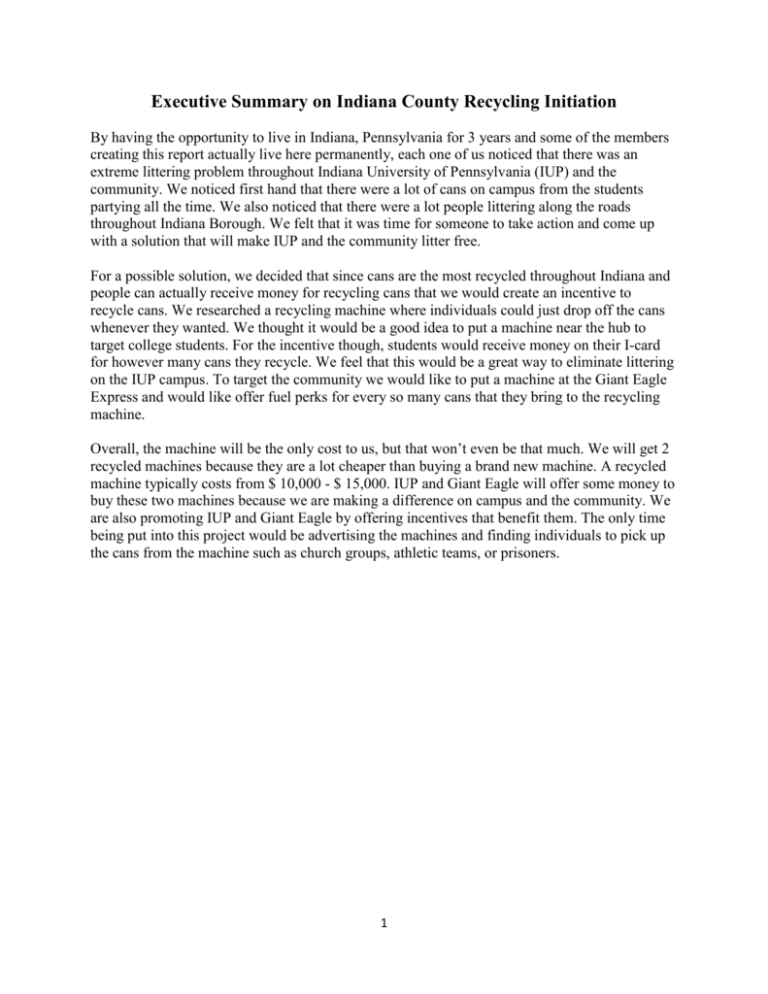
Executive Summary on Indiana County Recycling Initiation By having the opportunity to live in Indiana, Pennsylvania for 3 years and some of the members creating this report actually live here permanently, each one of us noticed that there was an extreme littering problem throughout Indiana University of Pennsylvania (IUP) and the community. We noticed first hand that there were a lot of cans on campus from the students partying all the time. We also noticed that there were a lot people littering along the roads throughout Indiana Borough. We felt that it was time for someone to take action and come up with a solution that will make IUP and the community litter free. For a possible solution, we decided that since cans are the most recycled throughout Indiana and people can actually receive money for recycling cans that we would create an incentive to recycle cans. We researched a recycling machine where individuals could just drop off the cans whenever they wanted. We thought it would be a good idea to put a machine near the hub to target college students. For the incentive though, students would receive money on their I-card for however many cans they recycle. We feel that this would be a great way to eliminate littering on the IUP campus. To target the community we would like to put a machine at the Giant Eagle Express and would like offer fuel perks for every so many cans that they bring to the recycling machine. Overall, the machine will be the only cost to us, but that won’t even be that much. We will get 2 recycled machines because they are a lot cheaper than buying a brand new machine. A recycled machine typically costs from $ 10,000 - $ 15,000. IUP and Giant Eagle will offer some money to buy these two machines because we are making a difference on campus and the community. We are also promoting IUP and Giant Eagle by offering incentives that benefit them. The only time being put into this project would be advertising the machines and finding individuals to pick up the cans from the machine such as church groups, athletic teams, or prisoners. 1 Table of Contents Executive Summary...................................................................................................................1 Introduction...............................................................................................................................3 Strengths....................................................................................................................................4 Weaknesses................................................................................................................................6 Opportunities.............................................................................................................................7 Threats.......................................................................................................................................8 Supporting Research ................................................................................................................9 Conclusions.............................................................................................................................13 Recommendations...................................................................................................................14 Appendix A.............................................................................................................................17 Table of Figures Figure 1. Sale Value of Materials Shipped in 2011.................................................................6 Figure 2. Materials Shipped in 2011 (tons)...........................................................................10 2 Introduction Have you seen the astonishing amount of aluminum cans around fraternity row and local apartments rented to Indiana University of Pennsylvania students? If one did not know any better you would think you were visiting the ghetto. Garbage like this is an eyesore that all Indiana residents and visitors to our small city have been exposed to. One knows when they are approaching the University due to the density of garbage which one is subjected to. What if we could change people’s thoughts, making the university eco-friendly? What if there was a way to make recycling beneficial and desirable to the student population. The pollution problem has been well documented around the school. The only way that an ecofriendly environment could thrive in the local area is to change the thoughts and feelings of the student body. This brings us to another problem. Changing people’s thoughts is going to be a difficult task. The change in student behavior will probably have to come from incentives. Many incentives are feasible, choosing the correct one will be the problem. Conducting a random student body poll will probably work the best. Another answer to the cleanup problem comes via volunteer groups. There are plenty of nonprofit groups such as: boy/girl scouts, Kiwanis, Moose, Elks and Rotary. An alternate source of man power is the local jail system. Many inmates will volunteer to clean up cans rather than sit in jail all day. Finally, we need to purchase two machines. We can ask local grocery stores for donations in return their name will be associated with the clean up giving the store a good name for pennies 3 on the dollar. Next choosing the correct location for the first and second machine is paramount. It will have to be somewhere close to the fraternities and the school. This is a problem that can and will be corrected. SWOT Analysis Under the SWOT analysis, our research team evaluated this concept’s strengths, weaknesses, opportunities, and threats within neighboring limits. This study breaks down some of the key areas of our plan of introducing aluminum recycling machines, and highlights some of the possible problems and restrictions that it could face. However, the study also examines the many benefits it could provide to Indiana. These aspects can be specifically identified as strengths within the SWOT analysis. Strengths Many of the strengths observed for the recycling machine benefit members of the community right here in Indiana. In fact, the largest benefit with this idea involves the overall appearance and cleanliness of the town. With greater incentives for students and members of the community to recycled used cans, more people will decide to recycle them, rather than ridding them in streets and garbage cans. Overall, these machines will reduce the aluminum waste in our town, and help create a better image of our community. Besides the aim of a cleaner town, these machines will also create economic benefits to students and people in the community. Our plan install IUP I-Card scanners in the machines will enable 4 students to receive credit on their cards for recycled cans. Students would simply swipe their ICard through the machine, insert their gathered cans, and earn money on their cards, which could be used at the IUP CO-OP Store for school materials. Members of the community who do not attend IUP would also be reimbursed for recycling their cans. Partnering with our local Giant Eagle grocery market, these same machines would also be able to scan Giant Eagle Fuel Perks cards, which provide customers with a way to save money on fuel at GetGo stations. Just as students can save money on school supplies, customers can earn fuel perks by recycling their aluminum cans. Members of the community can come in with their old pop cans that their family has used, or cans that they have found on the streets. Sustainability Not only will these machines provide reimbursement for people, but they will also be financially self-sustaining. A small percentage of each can scrapped for aluminum will go towards IUP and Giant Eagle to cover electric costs and services costs. This percentage will be low and not aimed at making profit, but for simply keeping the machines running. In addition, there is sound evidence which shows that similar aluminum can recycling machines are a stable and safe investment. (See Appendix A). Over the past few decades, the demand for aluminum has skyrocketed (McMillan). Therefore, the value of aluminum has risen an substantially across the United States. According to the Indiana County Solid Waste Authority/ Indiana County Recycling Center, the average sale value of aluminum cans was 1,332.31 per ton in 2010. (See figure 1). In 2011, this price rose to 1,629.72 per ton, standing as the highest valued material scrapped by the center. 5 Figure 1 Weaknesses The actions of proactive recycling on the IUP campus are increasing but still rather slow. Many students do not take advantage of the recycling resources available around the campus, due to either lack of interest or motivation. Especially around Indiana Township, there are few 6 opportunities in public areas to recycle unwanted aluminum cans. Therefore, the reaction to the introduction of these machines may see a slow start. It may take some time before students and/or the public to recognize the value in recycling cans and to shift the cultural attitude of the town. The shift to becoming more environmentally aware is steadily changing the way people in our community behave. Introducing this new machine will help shift this awareness; however, the change will take time. Admittedly, changing the habits of the community and students won’t come solely from this idea. However, implementing these concepts may help move our community into acting with more sustainable and environmental ideas. Adequate funding will be needed in order to purchase the recycling machines and to install the equipment in predetermined locations. These machines operate large scales, heavy compaction motors, scanners, and are capable of holding thousands of cans. Therefore, the costs of purchasing a unit can range between $10,000 – $12,000. In order to compensate for this cost, we plan to partner with Giant Eagle, where in exchange for a financial sponsorship; one of the recycling machines will be located outside of their store. Opportunities Recycling across the nation is become more popular, changing in cause of the increasing awareness of pollution greatly affecting our environment and through the publicized effects of global warming. In this movement, aluminum recycling offers a great opportunity to make an earth friendly difference while maintaining self-sustainability. Providing that this concept proves successful in our community, it could spread to other grocery stores and possibly gas stations in 7 the area as well as expanding into neighboring towns. As a movement, this idea could be shared with colleges outside our own, possibly expanding these “green machines” onto other campuses in our state. Volunteering opportunities could also be created with this idea. Community members or students who are looking to do a beneficial service to the Indiana County’s cleanliness could volunteer to service these machines and transport the recycled material to the scrap yard. In addition, IUP fund-raisers could be started by asking people students know to collect cans in order to earn money for a school event. The field of recyclable materials is growing as technologies improve the way we reuse raw materials. This provides a great opportunity to expand into other recyclable materials such as glass, paper, and plastics. Although the marginal scrap profit of these materials is too low to provide monetary reimbursement, providing students with alternative rewards such as CO-OP store coupons or a recycling points rewards system where students can earn different items donated by sponsors of a green campus. Threats The potential threats within this project include all other recycling centers around the area which accept aluminum cans. Most people who do recycle in this Indiana Township do so using the green bins provided by the Solid Waste Authority. This is a convenient way for people to get rid of aluminum cans instead of taking them to the recycling center. Other companies, such RSM, 8 which is stationed right outside IUP, operate profitable scrap and salvage yards. In fact, RSM will pay cash for aluminum cans in high quantities. (RSM). However, because the goal of this initiative is to reduce the overall waste around the county and to encourage greater recycling habits, these potential threats can actually help us achieve success, by providing alternative ways to rid of recyclables. Other possible threats include vandalism to the machines and technical problems with the coordination of I-Card and Fuel Perks scanners. However, these threats exist within in business regardless of the field involved. This model will take in account for the unexpected costs that arise from these problems. Part of the percentage of each can recycled will cover these costs. Supporting Research As the mentioned before, this program contains its strength, weakness, opportunities, and threats. But there have been several successful business models on this recycling machine. At first, for the investigator, it is not a good business to investigate. Obviously, from the Regional Business News of the Stamford Redemption Center Inc., this business triumph is the results from the cash deposit system and the collection services. It is simple and useful. “People bring unlimited amounts of cans and bottles to the redemption center at 30 S. Mary’s Ave., Stamford and receive cash for the deposit. Customers pay a handling charge of 2 cents on soda container and 1.5 cents on alcoholic bottles and cans” (Stempel, 1999). 9 In Indiana County, this program focuses on the aluminum cans. It is same as the soda container and alcoholic bottles. The percentage of aluminum cans from the date of the recycled material is fairly small. However, the unit price for the aluminum cans is higher than any other recycled material. In additional, from the Stamford Redemption model, Indiana County recycling center could use the same thing apply to this recycle machines program. (See figure 2). 10 “The Stamford Redemption Center has branched out by providing pickup service. Local restaurants and bars have a constant flow of redeemables, which the center can pick up and charge a handling fee for. The Stamford High School Marching Band recently worked with the center on a fundraising project. Barto’s group organized a recycling program and donated 4 cents for each bottle or can the band collected. He plans to work with other fund-raising project” (Stempel, 1999). Not only has the cash for the deposit, but also the service of collection needed to apply to this program. The Indiana County could initiate the community service by letting people collect the aluminum cans. This action could also save delivery fee by hiring workers for transportations. Furthermore, it could change people idea of recycling machines. People would contribute more and more to their living environments. For the long-term goal, once this recycling idea formed in people’s mind, it will easy to manage and operate this program. Besides, it will speed up the program to cover the original cost. Though this case happened in California, it also still can apply to Indiana County. Indiana has a lot less population, thus, the cost of the machine is a lot less than in California. Besides, It could work better in the place where it has great population such as in Los Angeles. Moreover, the competition is not as fierce as in big city. Once it forms its trends, it will become a center of 11 recycling. Despite what kind of material it focuses on, finally it will transform to a multi-material recycle center within a range include Altoona, Pittsburgh, Saltsburg, Greensburg, etc. “In addition to the United States, its products are sold in Canada, Mexico, Australia, New Zealand, Europe, Japan and Saudi Arabia” (Christie, 2009). Indiana County has been a coal provider to the world for more and fifty year, as Pittsburgh’s steel industry submerged, It’s now the time to transform itself to new product. The recycle material would be the best choice. Though out this program, it not only just attracts the neighborhood cities, but also it can sell its own recycled products worldwide to the developing country. The market for this field and opportunity to make provide an eco-beneficial service to the county is open. 12 Conclusion Overall, our eco-friendly recycling program will be an incentive for IUP students and the community. This will not only keep Indiana more beautiful, it will also make people realize we are trying to take care of our environment. By setting up a recycling machine for aluminum cans at the new Giant Eagle Marketplace and also at the HUB it will be both convenient for students and the community. IUP students will be satisfied to receive a percentage of cash back on the Icards to fund whatever they need on campus, while townspeople will be able to get fuel perks from Giant Eagle. Since the machine can be quite simple to use, attend, and practically self-sustainable we feel very confident this will be a positive step towards cleaning up Indiana. It will just take a little time. Once we get the machine and get it running, the word should spread fairly quickly. For the community, since the Giant Eagle Market Place just recently opened it is going to draw a crowd and when they see a new recycling machine also take pride in recycling. We need to get this product out in the community and see how it works, that is the only way we will see results. Once we try it out, planning on a positive result, we will think about expanding our eco-friendly machines. There are opportunity and benefits of having this recycling product. Fundraisers could help benefit local and IUP clubs to raise money while also advertising our machine. We feel this will be a huge benefit to the IUP campus and to the Indiana community in keeping our town clean and environment friendly. 13 Recommendations On college campuses all across the nation, there are millions of un-recycled soda cans, bottles, and numerous other refuse that is ruining the image of our college life. With the support of the community and a concentrated effort from students and residents alike, there could be an immense impact made on the community. Indiana is a college-driven town, when the students are back in town there is a large volume increase in waste. The Indiana University of Pennsylvania can participate in the green movement by simply purchasing two reverse vending machines from companies like Tesco or Tomra, the community has the opportunity to give back by simply refunding a small amount of money back to the people. The reverse vending machines would be placed at the Hadley Union Building and at a participating vendor. Ideally The Giant Eagle Express would be the two best locations. These machines cost roughly $10,000.00-$15,000 for a used machine. With all the recycling, the money raised could easily pay for the machines. The proposal would be as follows, for the reverse vending machines placed on campus, we could have a computer placed onto the vending machines that would allow students to slide their I-Card then dispose of their unwanted recyclable waste. For every aluminum can recycled, they would receive a small sum. This in turn could be the incentive to go green. With programs like RecycleMania, students are already joining the movement. We just have to jump aboard the bandwagon. For other members of the community that are not in college, we could have a ticket program that would allow them to recycle their materials then take it to a participating vendor to get a cash or rewards based on what vendor they were participating through. 14 For example, if Giant Eagle Foods would join our cause, there could be a set amount decided on that would give them FuelPerks or some other kind or reward based on their recycling volume. It would also create more customer involvement at these vendors, which could potentially increase business revenues and profits. Also we would work on with RMS and other local scrap and recycling centers to coordinate the flow of money and cans. It would also bolster these scrap yards because the volume of the waste being recycled would increase due to the added participation by these new recyclers. Purchasing these reverse vending machines would be simple. We could work with the companies to set up a plan to order them. IUP’s student body could also set up a group in order to raise money to purchase these machines. Based on the revenues from the machines, we could use the surplus of cash from the scrap price compared to the price we pay the students and residents to improve the community and purchase items that are needed or we could donate them to the local charities in the area. Students would also use the money from the recycling to buy books, school supplies, food, and other amenities sold in the area. The opportunity to put two reverse vending machines in the community of Indiana would be extremely beneficial to everyone. They would create a cycle that would improve the community and draw attention to the importance of recycling and keeping the community clean and wellkept. It would reduce waste, make the community look nicer, give students the opportunity to gain benefits by going green, and reduce the amount of garbage surrounding IUP’s campus. This has to be a wide-spread effort by everyone, but it can be a huge benefit to our community. 15 Bibliography Strempel, D. (1999). Redeeming bottles and cans proves a lucrative business. Fairfield County Business Journal, 38(29), 17. Christie, T. (2009, November 1). Company bulks up: A manufacturer of recycling equipment gets a big contract. Register Guard, The (Eugene, OR). RSM (2001, Yellowbook USA, Inc) Scrap Metal. RSM Company-steel.com. Web. 29 May 2012. <http://www.rsmcompany-steel.com/indiana-pa-scrap-metal.htm>. (December 15, 2011 Thursday ). Save the environment by recycling. Dhaka Courier, Retrieved from www.lexisnexis.com/hottopics/lnacademic Aluminum can recycling rate reaches highest level in more than a decade. (2011). Beverage Industry, 102(7), 8. McMillan, C. A., Moore, M. R., Keoleian, G. A., & Bulkley, J. W. (2010). Quantifying U.S. aluminum in-use stocks and their relationship with economic output. Ecological Economics, 69(12), 2606-2613. doi:10.1016/j.ecolecon.2010.08.005 16 Appendix A 17
